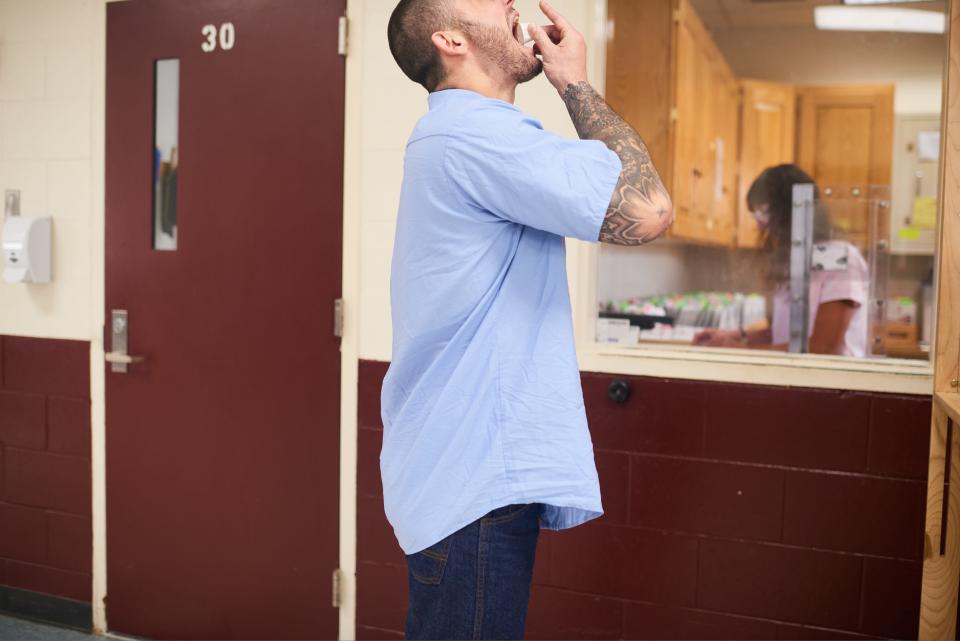Medication for opioid use disorder needed in state, local carceral system | Opinion
“If any harm follows, then you shall give life for life, eye for eye, tooth for tooth … ” — Exodus 21
In our society, we typically interpret “an eye for an eye” as a conditional statement: if someone steals my cat, then I steal their cat. Imagine my surprise when my undergrad theology professor said a more authentic interpretation was one of limitation: if someone steals my cat, I can’t burn their house down. In that moment, a law of retribution became one of restoration.

The Biden administration just proposed a historic drug control strategy “to save lives, expand treatment, and disrupt trafficking.” Included is a plan to expand medication for opioid use disorder (MOUD) throughout federal carceral settings. Similar comprehensive MOUD treatment mandates should be adopted by the state of Tennessee and local jurisdictions.
MOUD (such as methadone and buprenorphine) and comprehensive substance use counseling increase rates of recovery from opioid use disorder and reduce relapse, overdose and recidivism rates in the carceral system. Some balk at the idea of providing care to individuals who might not seek it if they weren’t incarcerated. Others cringe at the price tag. Others may think, “Why care about standards in the prison system? Isn’t the point to punish offenders?”
Our society just can’t seem to decide what the carceral system is for. Sometimes it’s reparational — someone has committed detrimental acts and must serve time to repay the debt. Sometimes it’s rehabilitative — someone realizes the consequences of their actions and makes changes in their life. And sometimes it’s retributive — punishment fitting of the crime. Maybe it’s a combination. And how do we decide? Perhaps the type and severity of the alleged crime, but I argue most often the definition of “justice” relies on public opinion of the accused individual.
Hear more Tennessee voices: Get the weekly opinion newsletter for insightful and thought-provoking columns.
Few Tennesseans could say they don’t know anyone who has been affected by the opioid crisis in our country. What began as a dream come true has turned into a living nightmare — prescription opioids provided folks relief from severe pain but carried an undisclosed risk of dependence. Trips to their pharmacy morphed into visits to their dealer. People in these cases don’t typically get “hooked” on opioids to get high. Rather, they quickly develop a tolerance and therefore must take higher doses to find the same pain relief. In turn, withdrawal symptoms — excessive cold sweats, light sensitivity, vomiting and severe muscle pain — increase in frequency and severity over time. While these symptoms are rarely fatal, people experiencing them report they feel like they’re dying.

Your state. Your stories. Support more reporting like this.
A subscription gives you unlimited access to stories across Tennessee that make a difference in your life and the lives of those around you. Click here to become a subscriber.
MOUD, withdrawal and overdose aren’t new; people have used heroin and fentanyl for decades. MOUD is an overdue human-focused solution to a long-ignored problem. People should not be forced to detox on a cold prison floor, to withstand crippling bone and muscle pains, to psychically suffer through mental anguish. Such withdrawal symptoms are in line with what Justice William Brennan defined as “cruel and unusual punishment.” His principles are a standard to determine if a punishment “comports with human dignity” according to our “evolving standards of decency.”
Incarceration without MOUD does not comport with human dignity. I urge state and local jurisdictions to adopt MOUD and other medication-assisted treatments for substance use disorders. Individuals in the carceral system are human beings with inherent indisputable rights. Through MOUD, maybe we can take a single step from a retributive “eye for an eye” and toward a more restorative “rupture and repair.”
Lucas Womack is a harm reduction counselor who grew up in East Tennessee and lives in New York City. He is an MSW student (Class of 2022) at the NYU Silver School of Social Work.
This article originally appeared on Nashville Tennessean: Medication for opioid use disorder needed in carceral system

